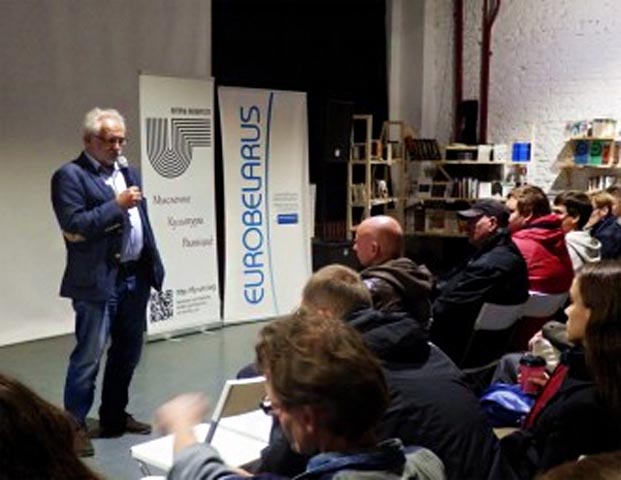The Belarusan National Platform of the EaP CSF issued a statement in connection with the wave of searches in the editorial offices of the Belarusan media and the detention of journalists.
Uladzimir Matskevich: We have to learn how to build relations with artificial intelligence today (Photo)

What should we do if people behave like machines, how not to turn into animals with an absolute income and why Belarus is a primitive megamachine.
Within the frames of the Week of Belarusan Thinking the Flying University and the International Consortium “EuroBelarus” organized a series of public lectures “Imagining Belarus: Ideas and images for common future.” A philosopher and methodologist Uladzimir Matskevich presented another public lecture in Minsk called “People, machines, and animals: friendship and temptation.”
He started the presentation with the phrase that has already become a pithy saying in social networks: “My world will never be the same again.” Such thing happens after strong impressions, meetings, and lectures... We do not expect this “change of the world” on purpose and cannot prepare ourselves for it.
“But can the humanity get ready and what should happen for us to announce that the world will never be the same again?” asks Matskevich, speaking about anthropological perspectives of our future.

Let’s take the emergence of artificial intelligence. The dream to create computing capable of accomplishing tasks that the human mind can’t has appeared as early as in the Middle Ages. Anyway, eventually we will have to engage with not only people but also with machines, which can have “their own world.” Therefore, many are not ready to accept it, and sign petitions demanding to end the research in the field of artificial intelligence. But, according to Uladzimir Matskevich, it won’t help, as in the struggle people vs. machines the latter will always win. Therefore, we must learn how to build relations with them.
The late 40s witnessed the emergence of the program Eliza, which simulates psychotherapeutic speech.
In 1930 Lewis Mumford described the so-called “megamachines” that are made of people. Their peculiarity is that they don’t work without people.
Later, institutions and states started to be perceived as megamachines.

All technological trends tend to maximize automation and eliminate humans from the process of machine management.
“A person would not need to have a private car when they would just call one with an Internet connection. […]. Considering the state as a megamachine, we understand that someone had to design it, operate it, assign tasks, etc. A car or an airplane without a driver differs from a car or airplane with a driver in the fact that an automatized car doesn’t know where to go,” Uladzimir Matskevich says.
What if there is no state leader, parliament, or ideologist that commands where to go? Will a megamachine stop? No. Even though people created states, the latter can exist without people.
“We can compare the Belarusan state and the US as two megamachines with and without a driver. Does it matter at all who wins the US elections? The American car will go where it should, with any president. In Belarus, we think that if we replace the president everything will be different. In fact, it won’t. Belarusan megamachine can stop, as it is primitive, and it doesn’t move without Lukashenka. But if we improve it, probably change it into a parliamentary republic, the state will be able run without a driver,” the speaker argued.

But if it is true, a machine may acquire the qualities of a person. And then the car would know where you should go better than you. In that case, you won’t have to express your will and your world will never be the same again. According to Uladzimir Matskevich, this is already happening.
“I see the behavior of the machine among the majority of the “inhabitants” of social networks,” the speaker said.
We go to work not because we want to, but because — what else can we do, right? We utter something; but these words are such banalities that have been told long ago.
“Whether we like it or not, we have to be friends with the machines. We are already in a very complex relationship with them; we co-exist, but we cannot be friends,” Uladzimir Matskevich says.
Smart cities will program and algorithmize our lives. According to Uladzimir Matskevich, once you realize this and start to seek a way out, it can be found in the... animal existence of humanity. And this is where the temptation lies.
“What is absolute income? It is taking people for maintenance as home pets. They are not required to work, accomplish tasks or use creativity. All the basic needs are satisfied,” said the philosopher and methodologist.

According to Matskevich, there are several alternative ways: to seek self-determination worldwide; get the intellect back and cultivate it; abandon intellect and live in a “ghetto” with absolute income; to fight for your interests and engage in politics.
Consequently, the humanity can be divided into three groups: those who had long been aware of the problem and started to seek self-determination; those who cannot find themselves in a world that has changed, and those who are happy to have their basic needs covered.
People from the first group are not attached to the place of residence, occupation, etc. People of the second group can’t get hold of it, as there’s always something that interferes. As for the third group, they are satisfied with what they have.
In Belarus, there are people of all the three groups, and they don’t understand each other, don’t enter into any kind of relationship, and even if they do, they communicate through megamachines. But only people of the second group need such values as a nation, language, independence, democracy, freedom, etc. However, without the knowledge and skills of people from the first group the problems of the second one cannot be solved.
As a way-out, Uladzimir Matskevich suggests learning how to build relations between humans and machines, as well as establishing a dialogue between the people of the first and second groups.

EuroBelarus Information Service
Others
-
Statement of the Belarusan EaP CSF National Platform on solidarity with the civil society of Armenia
The Belarusan National Platform of the Eastern Partnership Civil Society Forum issued a statement on solidarity with the civil society of Armenia.
-
Statement of the BNP in connection with the criminal prosecution of the leaders of the Belarusan independent trade unions
The Belarusan National Platform of the Eastern Partnership Civil Society Forum issued a statement in connection with the criminal prosecution of the leaders of the Belarusan independent trade unions.
-
Final event of project CHOICE — Paving the way to European Year of Cultural Heritage 2018
The final event of the two-year EU funded project CHOICE — Cultural Heritage: Opportunity for Improving Civic Engagement was held on June 6, 2017 at the Committee of the Regions, in Brussels.
-
Heritage is a verb. The results of the CHOICE project were summarized in Minsk (Photos and video)
Does Belarus need a “Public Ministry of Culture” and “Ašmiany Charter” to deal with the historical and cultural sites?








Comments
From farewell to a new Eastern policy and towards a new development
Poland and Germany were both initiators and drivers of a New Eastern policy linked to the Eastern neighborhood and Russia/Soviet Union.